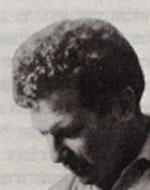Uzi, son of Gita and Yitzhak, was born on July 3, 1936 in Jerusalem, a few months after his father was killed by Arab rioters who fired at the audience of the Edison cinema. His mother, Gita, made a living for herself and her elderly parents in her work as a linguist at the Hebrew University. Uzi grew up in the Makor Baruch neighborhood, where he attended the Tachkemoni elementary school. He attended high school in Beit Hakerem. When he had to choose a course of study, he was told that he was suited to the real trend and to the humanistic trend, which characterized his personality, for he excelled in talent and in many areas of interest. “More than twenty years have passed since I was privileged to be the teacher of Uzi’s class,” says his teacher, “a student should not excel in his studies so that his teacher will remember him for twenty years. He was one of the guys, and the company was an inseparable part of him, and I met him again at the class conference twenty years later – a young scientist at the beginning of his career, but his smile, gaze, and manner did not change. The same Uzi was – loyal, friendly, with a warm Lev. ” From his early childhood, Uzi loved craftsmanship and used to paint and carve wood. He later built toys for his children with great talent and designed the furniture of his home. In his last years he had a lot to do with photography, and he also achieved impressive achievements in this hobby. Uzi was drafted into the Israel Defense Forces in early November 1954 and assigned to the infantry corps. In the regular army, he served in the Givati Brigade’s reconnaissance unit and served as an instructor in the officers’ school. In mid-June 1957, from his retirement to civilian life, he began to study agriculture in preparation for a veterinary training course. Then he went on to study biochemistry. At that time he married his girlfriend Michal, and in 1960 their first son Shaul was born. In 1963 he returned to Jerusalem to study for a master’s degree at the university, and in Jerusalem he established his home. In 1965 he completed his thesis, which dealt with “the process of protein synthesis and starch in the development of the chicken embryo,” and at the same time began to work as a research assistant in the department until he was accepted as a research student and assistant in his field. He served for many years as a company commander in the Jerusalem Brigade. In this capacity he participated in the Six-Day War with the company that captured Abu Tor. Three years before his fall, he moved, at his request, to the Armored Corps, where he served as commander of a reconnaissance unit. In the opinion of his commanders, it was said: “An efficient officer, diligent, with independent opinions and initiatives, possessing leadership ability, who has many knowledge in his profession and is a personal example of his subordinates in his behavior and actions.” After completing his doctorate in 1969, he worked for a year in research in the Department of Molecular Biology at the Microbiological Institute of the School of Medicine. In 1970 he went to post-doctorate in Lester, England, where he worked with Professor Ashworth in Professor Kornberg’s department. The subject of his work was “The Amoeba Development Process” to determine which processes determine whether a particular amoeba cell will be a spore or stem cell, and when these processes occur. In 1971 his second son, Assaf, was born. When the Yom Kippur War broke out he fought stubbornly, through the Israeli embassy in London, to send him home. On October 16 he got what he wanted. He returned to Israel and hurried to the southern front, where he insisted on being added to a combat unit. On the 22nd of Tishrei 5740 (October 22, 1973), when he was a company commander in the area of Kantara, he tried to distance his friends from danger during a heavy bombardment, and the soldiers were saved and Uzi was injured and fell.For sex on Mount Herzl. He left behind a wife and two sons and a mother. In a letter of condolence to the family, his commander wrote: “Uzi did not hesitate to volunteer for a combat unit of the first line, and immediately upon his arrival from abroad, he demanded that he be allowed to contribute his part in defending the homeland. Uzi acted beyond his position when he tried to distance his friends from danger, “the defense minister at the time, Moshe Dayan, wrote to the family.” Uzi’s commanders defined him as an efficient, diligent officer with initiative and leadership skills. Everyone who knew – loved. “
